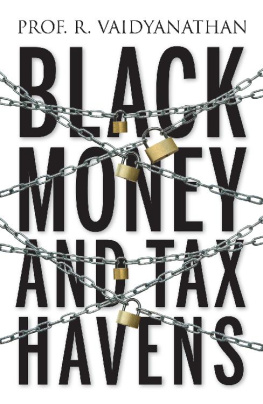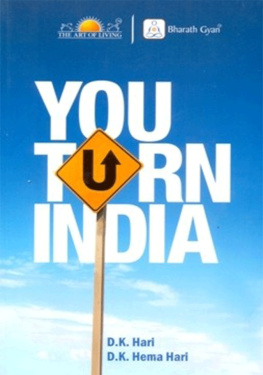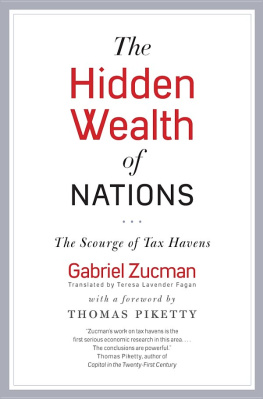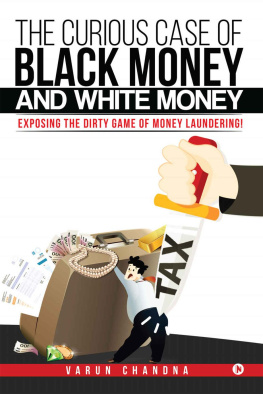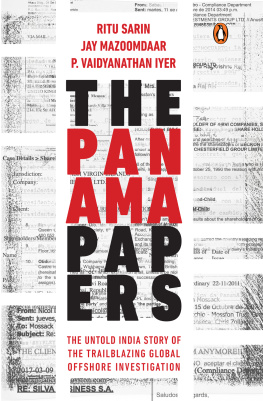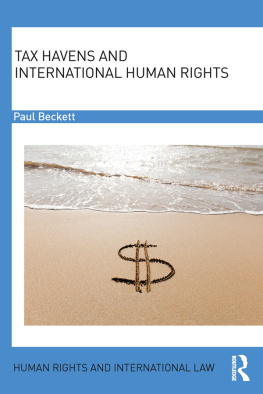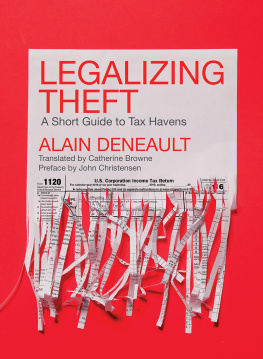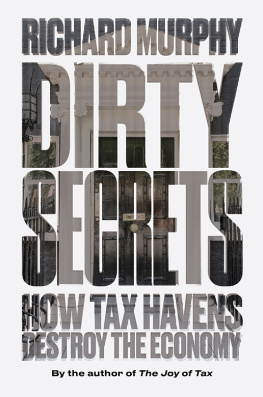westland publications ltd.
61, II Floor, Silverline Building, Alapakkam Main Road, Maduravoyal, Chennai 600095
93, I Floor, Sham Lal Road, Daryaganj, New Delhi 110002
First published by westland publications ltd. 2017
First e-book edition 2017
Copyright Prof. R. Vaidyanathan 2017
All rights reserved
10 9 8 7 6 5 4 3 2 1
ISBN: 9789386850072
This book is sold subject to the condition that it shall not by way of trade or otherwise, be lent, resold, hired out, circulated, and no reproduction in any form, in whole or in part (except for brief quotations in critical articles or reviews) may be made without written permission of the publishers.
This book on black money and tax havens has been in the pipeline for nearly a decade. I became interested in the subject around the year 2000 when the then-NDA (National Democratic Alliance) government headed by Atal Bihari Vajpayee initiated a treaty with Mauritius which paved the way for large inflows into Indian capital markets through what popularly became known as the Mauritius route. I saw it as paving the way for manipulation.
To understand how this can happen, it is necessary to delve a little bit into certain details about the corporate taxation regime in our country with special reference to taxation as it applies to multinational corporations. India has a Double Tax Avoidance Agreement (DTAA) with many countries, including the USA. All these agreements stipulate that taxes are to be paid in that country where profits are made. For instance, if Foreign Institutional Investors (FIIs) earn profits by trading in Indian stock markets, then they are bound to pay the capital gains tax in India, and the dividend tax in the USA. The only exception to this rule is via the DTAA with Mauritius where any company registered in Mauritius need not pay taxes in India. The then Finance Minister, Yashwant Sinhagot the Central Board of Direct Taxes to issue a circular (No. 789) to treat all FIIs registered in Mauritius as residents of Mauritius. Mauritius does not have a capital gains tax. This being the case, the issue of taxes does not arise.
Heres how the DTAA could be manipulated. Assume a pension fund, PF Inc., incorporated in the United States and then registers as an FII in India. The US-based pension fund also opens a subsidiary called PF Mauritius Ltd. in Mauritius and registers as a sub-account of PF Inc. in India.
This company then issues a Participatory Note (PN) to any entity which intends buying shares in India through the stock exchange. A foreign broker in India executes an order for the sub-account of the FII that is actually for the benefit of the holder of the PN. A rate of commission varying between 1.5 per cent and 2.5 per cent of the transacted value is paid as buying/selling and custodial charges. The funds thus flow into Indian stock exchanges
According to SEBI, this mechanism of trading through PNs outside India is utilized by FIIs to enter into transactions for clients who are otherwise not eligible for registration as (an) FII to trade in Indian markets or for those who may or may not be eligible but who want to hide their identities. Further, these PNs can enable the participant to whom these instruments are issued by FIIs to take benefit of the Mauritius Double Taxation Avoidance Treaty.
Then in 2007, I wrote that PNs were harmful to our economy since they help in round tripping:
Participatory Notes are a slap on the face of every citizen who is an investor. To invest in shares one has to fill up umpteen forms and provide proof of residence, PAN number, and so on. But for PN investors, the system is totally silent, even on basic information. Why not have confidence in the India story and realise that we can get funds with addresses without offering such anonymity?
This has to also be seen in context of concerns expressed by the then National Security Advisor M. K. Narayanan regarding the possibility of terror funds coming through financial markets in 2007.
These two incidents set me on the trail of black money, so to speak. Soon, the issue of tax havens too became an area of interest given that it was an area closely connected to black money.
Then, something interesting took place in the beginning of 2008. Germany presumably stole data from Liechtenstein Bank regarding tax evaders who had kept illicit money in that bank. They offered this data free to other countries. Initially, India did not show much interest. But, after I sent mails to all Members of Parliament (MPs), the then-leader of the opposition, Shri L. K. Advani pressurized the government to collect data on Indians who had kept funds illegally in that bank.
The government of the day asked for details from Germany but under the terms of the double taxation treaty. This implied that the names would not be revealed. Parallelly, the well-known lawyer and politician, Ram Jethmalani filed a petition in the Supreme Court to constitute a Special Investigative team (SIT) to look into the issue of illicit money kept abroad.
While the court did give a favourable decision in 2011, the UPA government did not act on it. Shri L. K. Advani, however, had already constituted a team (much earlier) consisting of Shri Ajit Doval, the current National Security Advisor, the lawyer, Mahesh Jethmalani, the financial expert, S. Gurumurthy and myself to study the issue of black money. Our report was released in two parts in 2009 and 2011.
Of course, much water has flown down the river Ganga since then. Among the many issues that the India Against Corruption grouping highlighted in its protests in 2011 was the issue of black money. This was also supported by Baba Ramdev and Sri Sri Ravishankar. Later, the political party Aam Aadmi Party (AAP) emerged out of this movement.
In fact, the entire period of 2009 to 2014 can be categorized as a period of turbulence against domestic and foreign black money. The said period also witnessed innumerable scams connected to the Commonwealth Games, spectrum allocation in the telecom sector, and allocation of coal blocks and so on. In a sense, the government formed in 2014 by the NDA can be seen as a culmination of all these movements and the stress was on probity in public life.
This book is an outcome of being a participant in, and an observer of, that journey.
Black Money
Black money has two inter-connected dimensionsdomestic and global.
Domestic illicit money is associated with corruption and tax evasion. But all black money is not due to corruption even though all corruption leads to black money. For instance, you may visit a doctor and pay him cash of say, Rs. 500 as consultation fees. If he does not show it in his income, then in a sense it is black money. So is the case of payment in cash in a petrol pump which may not be included in their income and subsequent tax calculation.
But it is also to be noted that all income on which taxes are not paid is also not black money. For instance, agriculture income in India is not taxed. Agriculture constitutes nearly eighteen to twenty per cent of our Gross Domestic Product (GDP) and so the entire agricultural income cannot be termed as black money since it is untaxed.


